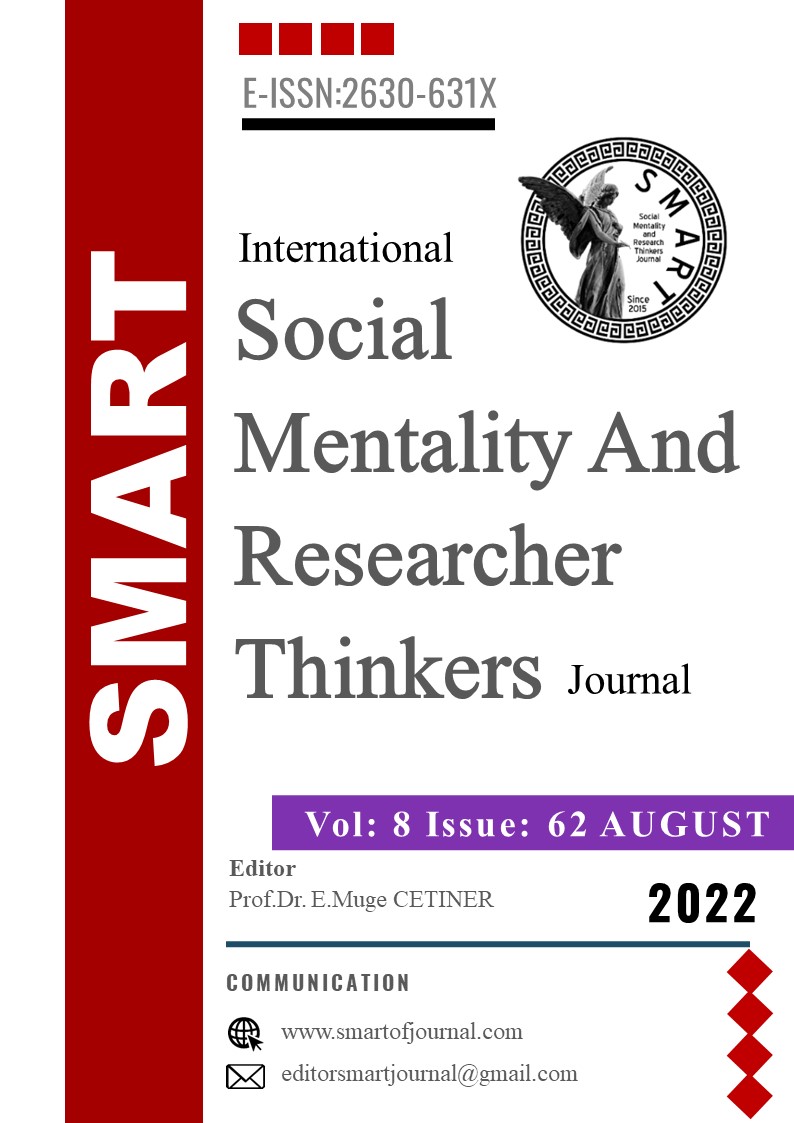Author :
Abstract
Batının geliştirdiği ve dünyaya yaydığı modernizm, içinde barındırdığı pek çok açmaz nedeniyle belli dönemlerde tıkanmış ve farklı ölçeklerde krizlere yol açmıştır. Söz konusu krizlerin giderek artan yıkıcı etkilerinin en aza indirilmesi çabası içerisine giren modernizmin uygulayıcısı niteliğindeki kesimler, bu kez suçu modernizmin yarattığı kuralcılık ve belirleyiciliğe yükleyerek, sözde kuralcılık ve belirleyiciliğe karşı olduğu savı ile post-modern düşünceyi insanlığa servis etmişlerdir.
Batı bu post-modernist söylem ile kendini aşmaya, yeni bir değerler dizisi oluşturmaya çalışırken aslında, varılan bu sürdürülemezlik gerçeği karşısında, eleştiri ve süreci doğruya yöneltme fırsatını başkasına bırakmadan yine kendisi yapmıştır.
Bu sürecin daha başında modernizm çabalarına izleyici olarak katılım gösteren Doğu ise, gün yüzüne çıkan geri kalmışlığını giderme çabasıyla diğer tüm kaygılarından azade ve her ne pahasına olursa olsun ekonomik büyüme performansına odaklanmış biçimde umarsız bir koşu içinde olmuştur.
Yapılan bu çalışmada, 80’li yıllarla birlikte devreye giren neoliberal küreselleşme sürecinde yaygın olarak uygulanan finansal liberalizasyon politikaları ile eş anlı olarak gelişmekte olan ülkelerde ve Türkiye’de ortaya çıkan olumsuzlukların nedenselliğinin belirlenmesi amaçlanmaktadır
Keywords
Abstract
Modernism, which the West developed and spread to the world, was blocked in certain periods due to the many dilemmas it contained and led to crises of different scales. The practitioners of modernism, trying to minimize the increasingly destructive effects of the aforementioned crises, have this time put the blame on the normativeness and determinism created by modernism, and they have served the post-modern thought to humanity with the argument that it is against so-called rule-making and determinism.
While the West is trying to overcome itself and create a new set of values with this post-modernist discourse, in fact, in the face of this unsustainable reality, it has done it itself without leaving the opportunity to direct the criticism and process to the right.
The East, which participated in the efforts of modernism as a spectator at the very beginning of this process, has been in a desperate run, free from all other concerns and focused on economic growth performance at any cost, in an effort to eliminate its backwardness.
In this study, it is aimed to determine the causality of the negativities that emerged in developing countries and Turkey simultaneously with the financial liberalization policies widely applied in the neoliberal globalization process that came into effect with the 1980s.
Keywords
- 1. Akyüz, Y. (1993), “Financial Liberalization: The Key Issues”, UNCTAD Discussion Papers, No: 56, s.6.
- 2. Akyüz, Y. (2004), “Managing Financial Instability and Shocks”, İktisat, İşletme ve Finans Dergisi, (219), Haziran, s. 7.
- 3. Arın, T. (2003), “Türkiye’de Mali Küreselleşme ve Mali Birikim ile Reel Birikimin Birbirinden Kopması, (Ed. Köse, A. H., Şenses, F. & Yeldan, E)., Küresel Düzen: Birikim, Devlet ve Sınıflar, İletişim Yayınları, İstanbul.
- 4. Ertürk, E. (2001). Uluslararası İktisat, 2.b. Alfa Basım Yayım, İstanbul.
- 5. Esen, O. (1998) “Gelişmekte Olan Ülkelerde Uygulanan Finansal Serbestleşme Programlarına Eleştirel Bir Yaklaşım”, İktisat, İşletme ve Finans, (145), Nisan, s.24.
- 6. Galbis, V. (1977). “Financial Intermediation and Economic Growth in Less Developed Countries: A Theoretical Approach”, Journal of Development Studies, (12), No: 2, s.59.
- 7. Grabel, I. (1993), “Fast Money, Noisy Growth: A Noise-Led Theory of Development”, Review of Radical Political Economics, (25), No: 1, s.8.
- 8. Grabel, I. (1995), “Speculation-Led Economic Development: A Post-Keynesian Interpretation of Financila Liberalization Programmes in the Third World”, International Review of Applied Economics, (9), No: 2, s. 128
- 9. Kaminsky, G. L. & Reinhart, C. M. (1999), “The Twin Crisis: The Cause of Banking and Balance of Payments Problems”, American Economic Review, (89), No:3, s. 483.
- 10. Kane E. J. & Demirgüç-Kunt, A. (2001), “Deposit Insurance Around the Globe: Where Does It Work? NBER Working Paper, No: 8493.
- 11. Kaplan, C. (1999), “Finansal Yenilikler ve Piyasalar üzerindeki Etkileri: Türkiye Örneği”, TCMB, Tartışma Tebliği No. 9910.
- 12. Kapur, B. K. (1976), “Alternative Stabilization Policies for Less Developed Economies”, Journal of Political Economy, (84), No: 4.
- 13. Kapur, B. K. (1983), “Optimal Financial and Foreign Exchange Liberalization of Less Developed Economies”, Quarterly Journal of Economics, (98).
- 14. Krugman, P. & Obstfeld, M. (1991). International Economics: Theory and Policy, 2nd. Edt., Harper- Collins Publishers Inc., New York.
- 15. Mathieson, D. J. (1979) “Financial Reform and Capital Flows in a Developing Economy” IMF Staff Paper, No: 26
- 16. Mathieson, D. J. (1980) “Financial Reform and Stabilization Policy in a Developing Economy”, Journal of Development Economics, (7), No: 3.
- 17. McKinnon, R. I. (1973), Money and Capital in Economic Development, The Brooking Institution, Washington D.C.
- 18. McKinnon, R. I. (1998), “International Overborrowing: A Decomposition of Credit and Currency Risks”, Stanford University, Department of Economics, Working Papers, No: 98004.
- 19. McKinnon, R. I & Pill, H. (1997): “Credible Economic Liberalization and Overborrowing”, American Economic Review, (87), No: 2, s. 190.
- 20. McKinnon, R. I & Pill, H. (1999): “Exchange Rate Regimes for Emerging Markets: Moral Hazard and International Overborrowing”, Oxford Review of Economic Policy, Vol: 15, No: 3, s.23.
- 21. Mertron, R. & Bodie, Z. (1995). “A Conceptual Framework for Analyzing the Financial Environment”, The Global Financial System: A Functional Perspective, (edt. Crane B. Dwight, C. B.), Harvard Business School Press, Boston M.A.
- 22. Rosier, B. (1994). İktisadi Kriz Kuramları, (çev. Yentürk, N.), İletişim Yayınları, İstanbul.
- 23. Shaw, E. S. (1973), Financial Deepening in Economic Development, Oxford University Press, New York.
- 24. Soyak, A.& Bahçekapılı, C. (1998), “İktisadi Krizler-IMF Politikaları İlişkisi ve Finance and Development Dergisi’ndeki Yansımaları”, İktisat, İşletme ve Finans Dergisi, (144), 52.
- 25. Stiglitz, J. E. (2002). Küreselleşme Büyük Hayal Kırıklığı, (çev. Taşçıoğlu, A. & Vural, D.), Plan B Yayıncılık, İstanbul.
- 26. Uzunoğlu, S., Alkin,K. & Gürlesel, C. F. (1995), Uluslararası Sermaye Hareketlerinin Gelişmekte Olan Ülkelerde Makroekonomik Etkileri ve Türkiye, İMKB Araştırma Yayınları, No: 6, İstanbul.
- 27. Yeldan, E. (2001). Küreselleşme Sürecinde Türkiye Ekonomisi: Bölüşüm, Birikim ve Büyüme, İletişim
